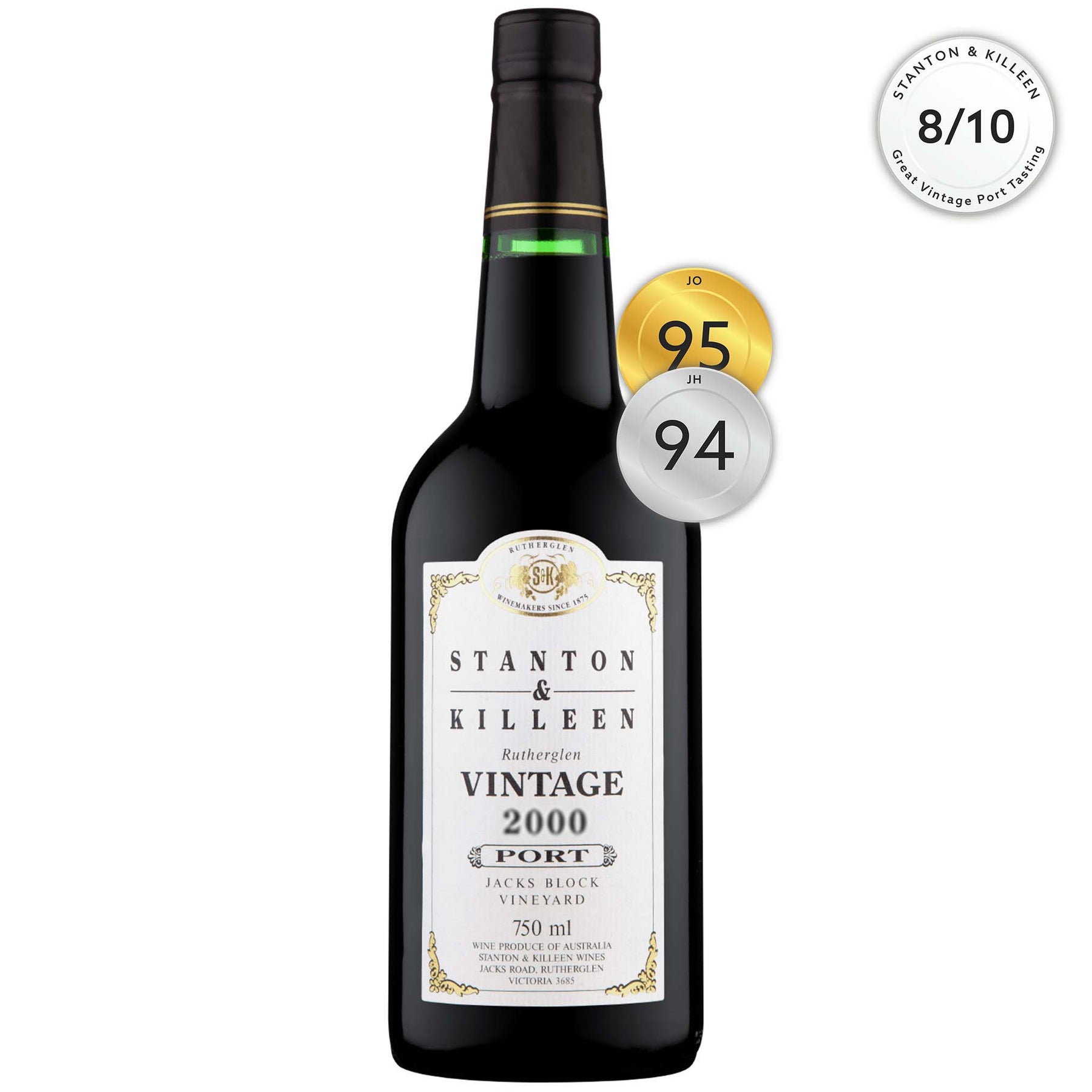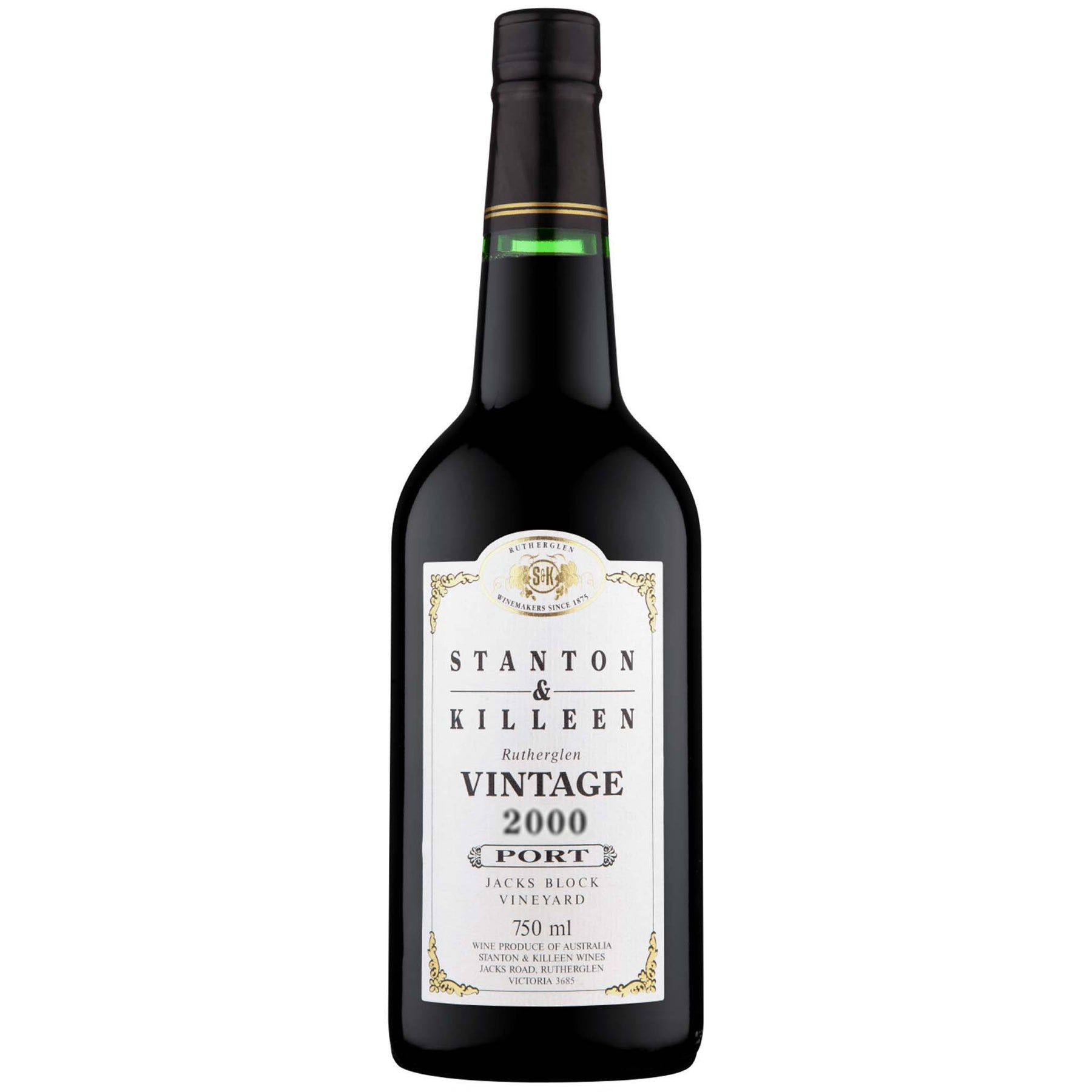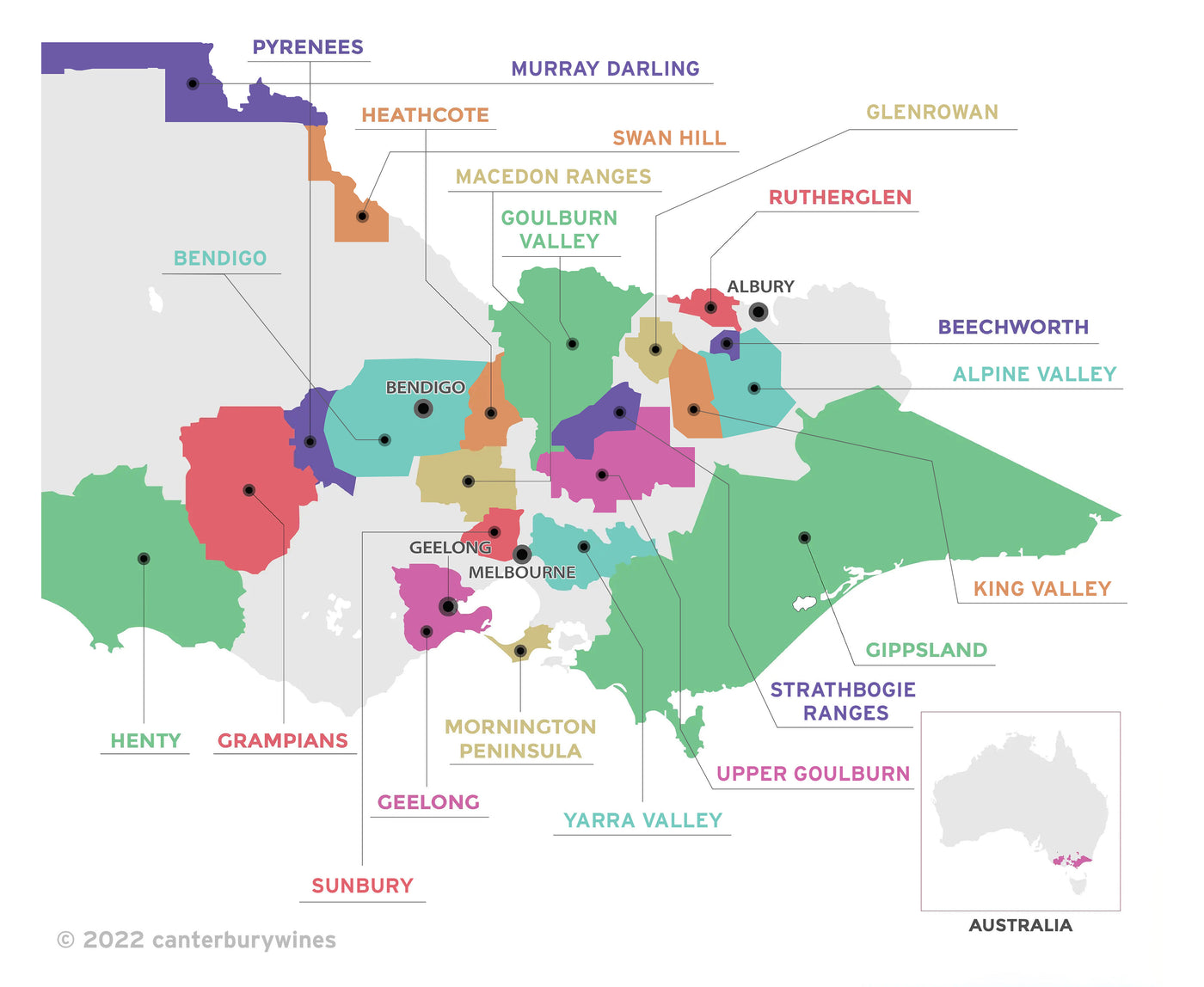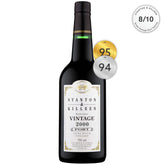

Stanton & Killeen Vintage Port 2000
Style: Fortified
Closure: Cork
Stanton & Killeen Vintage Port 2000
Warehouse
34 Redland Drive
Vermont VIC 3133
Australia
Critic Score: 95
Alcohol: 17.7%
Size: 750 ml
Drink by: 2040
Stanton and Killeen is one of the great pioneering wine families of Rutherglen. They produce arguably the best Vintage Port in Australia, quite dry by Australian standards and closer to the Portuguese style. It is, according to James Halliday, "ludicrously underpriced".
"Charmingly seductive, this savoury and slightly meaty wine is harmonious, approachable and integrated. Clean notes of spirit lift its sweet, leathery and nutty aromas of licorice-like small red and black berries, chocolate and old, polished furtiture. Smooth and supple, full to medium in weight, it's long and fine-grained, delivering plenty of concentration and complexity." Jeremy Oliver
Expert reviews
"Charmingly seductive, this savoury and slightly meaty wine is harmonious, approachable and integrated. Clean notes of spirit lift its sweet, leathery and nutty aromas of licorice-like small red and black berries, chocolate and old, polished furtiture. Smooth and supple, full to medium in weight, it's long and fine-grained, delivering plenty of concentration and complexity. Drink 2008-2012+." Jeremy Oliver - 95 points.
"Totally stylish; a complex, spicy mix of three Portuguese varieties (80% of total blend); harmonious, dry palate. Drink Now-2017." James Halliday, Halliday Wine Companion - 94 points
"Varieties: Touriga, Tinto Cao, Tinta Barroca, Shiraz, Durif. Perfumed cherries and raspberries, the palate displays flavours of subtle elegant berries, hints of vanilla and a spice driven finish. Optimum drinking: 2014-2020. Potential: 2028" The Great Vintage Port Tasting II, Oct 2008 - Rating: 8/10
Chris Killeen

Chris Killeen was known as the Prince of Port among his peers
Chris Killeen was passionate about Portuguese ports and endeavoured to create a unique Australian style. He planted five Portuguese grape varieties in the 1990s, Souzao, Tinta Roriz, Tinta Barocca, Touriga Nacional and Tinto Cão. He moved away from the traditional sweet Australian style of port and is one of the first to produce this new style by blending the Portuguese varieties with Shiraz and Durif, creating a very savoury and age-worthy fortified wine.
In 2006, wine writer Jeni Port described Chris as "the man who almost single-handedly holds the future of Australian vintage port in this country”, a legacy that the winery continues to honour.
The following is an extract from an article by Jeni Port in The Sydney Morning Herald
Chris Killeen was born in 1954, a very good year for Rutherglen vintage port. Lindemans made a stunner and it was probably the centrepiece of a vast collection of vintage ports, many from Portugal, that Killeen would acquire during his short, brilliant career.
Every month, at the now legendary Rutherglen winemakers' dinners, he would delve into his collection and emerge with a wine with which to finish the night. Before a cork was pulled, the wine was masked. Drinkers would have to identify it, express their tasting emotions and think about the fruit flavours they were experiencing, the tannins, liquorice, chocolate and spice and the effect of ageing; then they could relax and enjoy the wine.
Vintage port was serious business to Killeen and at his family's winery, Stanton and Killeen in Rutherglen, he made some of the best in Australia. That he may now be viewed as one of the last great vintage port makers in this country is almost criminal but it's the truth. The traditional style no longer carries much cachet with drinkers and is rarely made. His was a dying art.
In the past few years he had been mentoring the next generation of Rutherglen "young bloods" in the fortified arts but at the end of vintage last year he was diagnosed with cancer. Now he has died, at 52.
Timothy Stanton had left his mechanic's job in Suffolk to seek gold in Victoria, ending up with a red gum-slab winery in the 1870s. When the old winery was torn down in the 1920s, nothing could destroy five open fermenting vats and six huge storage tanks, so Jack Stanton built a new winery around them, propping up the roof with massive tree trunks planted in the earthen floor.
The winery took the double-barrelled moniker about 1967, the first vintage for Norman Killeen, who had married Joan Stanton and stepped into the winemaking shoes of his famous father-in-law, Jack. Jack Stanton made only fortifieds, for which the area is world famous - muscat, tokay, port. Norm introduced the first reds.
Norm's son Chris was educated in Rutherglen, at Wesley College, Melbourne, the Marcus Oldham farm management college, Geelong, and the Riverina College of Advanced Education. He planted white grape varieties in 1981, which were eventually made into white wines in 1987. This formidable trio - grandfather, father and son - worked together in the winery well into the 1980s.
A good 150 years of tradition is what makes Rutherglen wines sacred to wine drinkers. Fortified wine production is not something to be tampered with lightly but Chris Killeen did see a reason with vintage port, a wine made from a single year that usually needs 10 years or more bottle age.
His father's greatest vintage port, from the 1972 vintage, was a wine of the old school, a reflection of a time when vintage port was sweeter against a background of plum pudding and rich raisiny flavours. Ripe Rutherglen shiraz was the perennial and prime ingredient.
But Killeen liked the drier Portuguese style made from different grape varieties - often five or six - with names beginning with the letter T: tinta cao, tinta roriz, tinta barroca and touriga. Shiraz was used as the base and Portuguese varieties were introduced into the blend after being picked at a lower ripeness for more elegant fruit flavours.
Killeen helped revolutionise vintage port production in Australia, transforming the traditional sweet style into something much drier, more fragrant and complex, and ultimately, profound. He was a maker of the strong classical style of Rutherglen shiraz and durif but he inherited Jack Stanton's touch with the fortifieds.
"He dedicated his life to a passion in wine," says his neighbour and fellow winemaker, Colin Campbell, who remembers Killeen's busy out-of-hours work chairing or working on committees trying to establish Rutherglen's tourism and wine name. These endeavours included the annual Winery Walkabout, the Rutherglen Wine Experience, the Winemakers of Rutherglen, his stewardship of the Rutherglen Wine Show - one of the biggest wine shows in Australia - and his work as a wine judge.
About the winery

Stanton and Killeen is one of the great pioneering wine families of Rutherglen. The family have been making full bodied robust reds, luscious muscats, tokays and fine vintage ports for more than 100 years.
Their story really begins in 1921 when Jack Stanton planted the ‘Jack's Block' Shiraz and Muscat vineyards. Today it still produces some of Stanton and Killeen's best fruit. Jack made only fortified wines - muscat, tokay, port - for which the area is world famous.
The two families came together when Norman Killeen married Jack Stanton's daughter Joan, and in 1954 she gave birth to 6th generation winemaker Chris Killeen. In 1968 the business name was changed to ‘Stanton & Killeen Wines' and thus started a new phase in the winery's history. Norman Killeen, who stepped into the winemaking shoes of his famous father-in-law Jack, introduced the first reds.
Norm's son Chris Killeen planted white grape varieties in 1981, which were eventually made into white wines in 1987. This formidable trio - grandfather, father and son - worked together in the winery well into the 1980s.
Chris was passionate about Portuguese port and endeavoured to create a unique Australian style. He planted five Portuguese grape varieties in the 1990s; Souzao, Tinta Roriz, Tinta Barocca, Touriga Nacional and Tinto Cão. He moved away from the traditional sweet Australian style of port and is one of the first to produce this new style by blending the Portuguese varieties with Shiraz and Durif, creating a very savoury and age-worthy fortified wine. Chris was known as the Prince of Port among his peers.
Following the sudden death of Chris in 2007, the family-run business is now fronted by mother-daughter team, Wendy and Natasha Killeen. The focus is on alternative Portuguese varieties, flavoursome Rutherglen red wine, and continuing S&K's long tradition of award-winning Muscats Topaques, Tawnys and Vintage Fortifieds.
"We've selected the best 30 acres from our fertile farmlands for the cultivation of our world class wines. Known for Vintage Port and fortified wine, we are blessed to have many unusual and rare varieties, carefully nurtured with dynamic and environmentally focussed viticulture.
Our vineyards produce outstanding fruit from over 100-year-old shiraz vines and established durif, muscat and Portuguese varieties tinto cao, tinta roriz, touriga nacional. More recently alvarinho, arinto, antoã vaz, souzão and touriga franca have been planted as they suit our climate and soils.
Internationally awarded muscats, topaques and vintage fortifieds sit alongside exciting new table wines including The Prince Reserva and, in exceptional vintages, individual expressions of our special varieties such as Tempranillo and Touriga Nacional. The sought-after Jack's Block Shiraz is made when nature permits and our traditional Rutherglen reds, Shiraz and Durif, display a generous palate.” Stanton & Killeen
Natasha Killeen eloquently expresses where Stanton and Killeen are positioned today: "My father Chris planted several Portuguese varieties 30 years ago for stylistic reasons – he loved Vintage Fortified (port) and wanted to make his own unique style with these varieties along with Shiraz and Durif. Fortunately, we could see that these varieties were the ones that coped the best with extended periods of drought and hot weather. In 2015, we planted two Portuguese white grapes, Arinto and Alvarinho, and a third, Antão Vaz, in 2020. It was somewhat of a risk because the varieties are not well known, and we weren't sure if our customers would enjoy them. However, we have been rewarded with beautiful wines, happy customers and thriving vineyards. Having diversity in the wines that we can produce has been excellent for our business but also makes growing grapes in our changing climate so much easier. Having varieties properly suited to our region means we are working with the vines, not against them, when the weather poses some challenging growing scenarios."

Victoria
Victoria is home to more than 800 wineries across 21 wine regions. The regions are Alpine Valley, Beechworth, Bendigo, Geelong, Gippsland, Glenrowan, Goulburn Valley, Grampians, Heathcote, Henty, King Valley, Macedon Ranges, Mornington Peninsula, Murray Darling, Pyrenees, Rutherglen, Strathbogie Ranges, Sunbury, Swan Hill, Upper Goulburn and Yarra Valley.
Victoria's first vines were planted at Yering in the Yarra Valley in 1838. By 1868 over 3,000 acres had been planted in Victoria, establishing Victoria as the premier wine State of the day. Today, the original vineyards planted at Best's Wines are among the oldest and rarest pre-phylloxera plantings in the world.
Victoria's climate varies from hot and dry in the north to cool in the south and each wine region specialises in different varietals. For example, Rutherglen in the north is famous for its opulent Muscats and Topaque and bold reds, while the many cooler climate regions near Melbourne produce world class Chardonnay and pinot Noir. Victoria is truly a wine lover's playground.

